This episode of The Legend of Korra gives us what we’ve been waiting for—a glimpse into the inner workings of Zaheer and his “Red Lotus” gang. I’m going to unpack that and sort through what we learn about our antagonists a-plenty, but that isn’t all we get, not by a long shot.
Last week I’d said we’d seen almost every kind of specialized bending, except the plantbending of the swamp folk. Well, now we’ve seen the Mos Eisley of the sandbenders, so check one more off the list. The desert seems “painted,” more brightly colored than the one where Sokka went cactus-juice crazy, but it still vibes Tattooine, right down to spirits being denied access to a saloon the way droids might be kicked out of a cantina. All this casual discrimination and political oppression! Almost makes you wish someone would do something about it, doesn’t it?
So I can stop calling it the “Red Lotus Society” now—no need for equivocating quotes! Zaheer and his crew of benders call themselves the Red Lotus Society, and the reason there’s an advanced bender of each element is because they were supposed to be Korra’s teachers, if their plan to kidnap her had worked. She accuses them of planning to brainwash her. I hope she at least stops to ask herself just what she thinks the White Lotus Society was doing, keeping her locked up and cut off from the outside while they raised her; ultimately, that shaped her beliefs about the world just as much. It also deepens the question of Zaheer’s personal background; presumably, he was meant to be her non-bending airbender instructor, but where did he learn his then-theoretical arts?
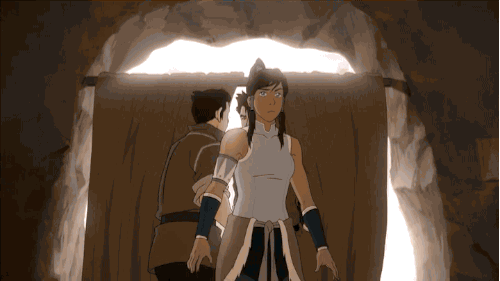
So this is Zaheer’s secret. He’s what I wish Amon had been from the beginning, a true believer…excelsior! The series has been about failed messiahs so far, in contrast to Korra as the genuine article. In Book One: Air, we had Amon. Amon’s iconography is unequaled, if you ask me—the mask, the self-possessed and minimalist body language, an organization of Equalists… Amon might have been “anti-bending,” but fundamentally his message was one of upsetting a broken social hierarchy. The problem was that his movement was betrayed. There was no Amon, no spirit-touched prophet, just Noatak, a bloodbender with a penchant for theatrics. Maybe Zaheer could take up the mask, or maybe Amon’s revolution will start again in another Avatar cycle, but to really be effective it needs to be more than an illusion.
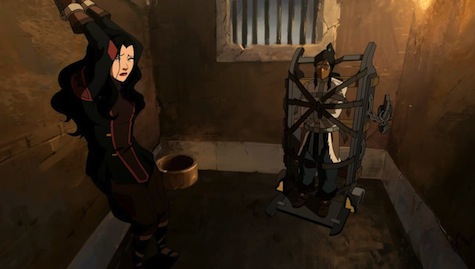
Then there was Unalaq, another would-be chosen one, for the villain of Book Two: Spirits. Unalaq is the tempter, rather than the ringleader, but his ambition is ultimately the same as Noatak’s: power. Oh, sure, Unalaq has a better claim on being the “messiah,” since the dark spirit Vaatu did bond with him, which did give Unalaq the powers of a Dark Avatar. In this episode we even find out that Unalaq was part of Zaheer’s Red Lotus society, before his pride and hubris betrayed them. It makes sense and is just good storytelling—all of the cosmic exposition from the previous story arc is back on the table. Unalaq is, ultimately, petty, and Korra defeats the merged Anti-Avatar on her own, even without her Avatar powers. (I still think that Korra will ultimately repair her link to her past lives by combining and balancing Raava and Vaatu inside of herself: Book Four: Balance?)
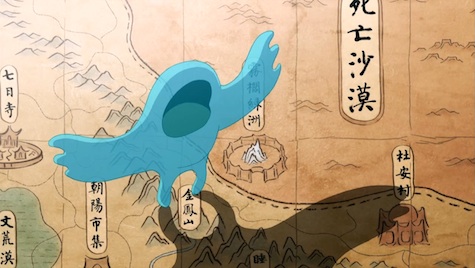
Korra is defined by—exonerated by—the failures of her enemies. Noatak was insincere, and believed that his secret skill of bloodbending could be used to bring the world under his control—he and Tarrlock both living in the shadow of their father Yakone—but Korra learned her secret skill of airbending. Rather than using it to dominate the world, she’s spreading it, teaching what she learned.
Unalaq wanted to set up a power system with himself on top and everyone—even his children—below him as second class citizens. He was Korra’s dark mentor, but he failed. Look at her and Tenzin; rather than a hierarchy, they’ve become each other’s peers. Unalaq embraced the power of the spirits; Korra embraces the enlightenment of the self. Noatak creates the false symbol of Amon; Korra embodies the true symbol of the Avatar. She learns from other’s mistakes.
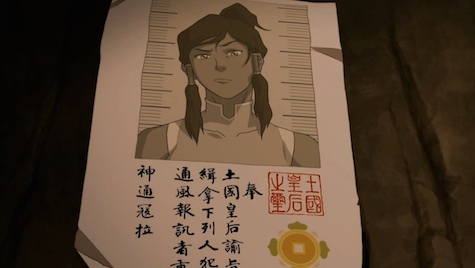
Zaheer seems to be at peace with himself. He has conviction, and that is one thing I think Korra can learn from him. I think she will pick up a belief in a cause. Her cause. What that cause is could be anything, but I’m betting that she ultimately defeats Zaheer and then pursues a similar agenda though non-subversive means, or with the authority of the Avatar. You have to admit, it is hard to argue that the Earth Queen should not be taken down. A tyrant doesn’t deserve to rule just because her father happened to be king, and let’s not forget what a useless leader he was in the first place. Heck, not to “Godwin the thread,” but Fire Lord Sozin and Ozai make pretty good arguments against aristocracy, too…
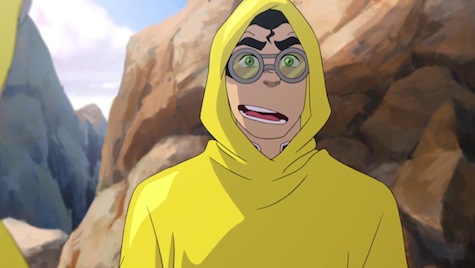
This episode also brings us some unexpected twists. Korra finally gets fed up with being patient and kicks in the front door… then lo and behold, she was right! They never would have discovered that the Red Lotus communicated by using the spirit world, otherwise. Mako and Bolin as Breaking Bad refugees is cute, but for me, you know what I really like—seeing their past actions inform their current behavior, or as experts call it, “character growth.” Mako knows how to be a cop, Bolin was a “mover” star, and both matter to the story. We get to hear more from Asami this episode than we’ve been getting—watching her dominate at Pai Sho made me a very happy Mordicai, and finding clues is always good—but I’m getting tired of crumbs. Pair her with Varrick if you have to, but give her a storyline!
Mordicai Knode knows the specific agony of having victory snatched from your claws by an upended game board and the subtle ecstacy of arguing about standardized rules. Find him at Tumblr or at Twitter.










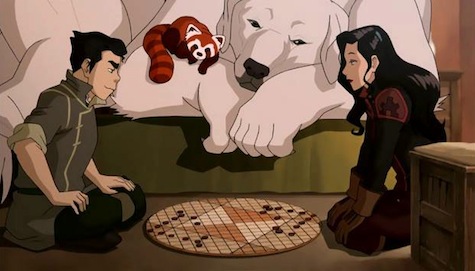
This episode was all about taunting the Korrasami shippers too.
That perfect shot of Asami, the lady fair, rescuing the dashing warrior as they rode away together on the warrior’s mighty steed!
Someone here called anarchism! YAY you! And I think Henry Rollins is KILLING it as Zaheer.
Asami said more words and did more things than in practically all the other episodes of this season combined! Yay!
I love the idea of “Book Four: Balance.” Ever since they announced SPIRITS as Book Three, I’ve been itching to know what Book Four would be called! Balance in my absolute favorite prediction so far (Others I’ve hear were Self, Cycle, Energy, and Water, to complete the cycle).
WHAT’S UP WITH GURU LAGHIMA, BY THE WAY?
1. Aeryl
I want Rollins to take his Twitter feed & use it to promote Korra! Then I realized that I’m naive & that Henry Rollin’s manager probably has an intern run his social media account. Still! You should tweet @@@@@henryrollins to tell him he’s doing a good job.
2. SerDragonReborn
Yeah, I wanted to see “Spirit” followed by Water, to close the cycle, for the same reason. Still, I think “Balance,” because while I’ve been off in lots of my other predictions– Koh! Really, Koh? But it could have worked!– but I still stand by the idea that Korra will balance Raava & Vaatu in the end. It seems neccisary to my sense of dramatic irony.
I thought she had already balance Raava and Vaatu by bringing them both in her.
I too am curious about what Book 4 will be called. “Air”, “Spirits”, “Change”…I don’t know. I don’t think it’ll be “Water”, but I don’t know what it’ll be. I think we may have a better idea once we get to the end of this season and truly see what the arc is and if there are any world changing consequences like the end of Book 2.
It’s just so refreshing to see the quality of everything in this book, though. Fantastic episodes, and I can’t wait to see the rest of them.
@@.-@: Book 4 is probably going to focus on the Fire Nation, just because each of the books has had a different element at its core. First one was air, then water, now earth—it’s the Avatar Cycle all over again. I think the reintroduction of Zuko serves as a sort of preview of what to expect in season 4. Either he’s going to die and they’re going to have to deal with the succession, or else there’s going to be some other problem in the Fire Nation to look into.
@7, Zuko’s daughter already rules the Fire Nation, IIRC, so he’s abdicated the throne already
@Robotech_Master
…kind of. Really though, the first two seasons were very much about the Water Tribes. Air factored into Korra’s training, but I didn’t think the first season was very much air themed. I think some more fire themed episodes in Book 4 would be pretty cool, though.
I’d still rather be watching this on my tv screen but I’ll take what I can get. The next Avatar will start with Earth. Fire was Roku, so I don’t know if the last book will take place in the Fire nation or not. Balance works for me, but hopefully we get to see book 4 no matter what it’s called.
I hadn’t been too upset about the show’s move to online release, but somehow the Nick.com player and my laptop aren’t getting along and I had to settle for jerky pictures, out-of-sync audio, and the picture freezing during the frenetic battle scenes. So now I’m somewhat more unhappy.
I like the way they managed to justify a “villain monologues about his whole plan” scene by establishing that it was a ploy to distract Korra. In fact, I kind of suspect that this was a setup all along; I still think Suyin is working with Zaheer and conveniently planted that note in the jeep. Although I’m no longer certain, since if it were a trap, wouldn’t the Red Lotus have already been waiting at the hotel? Hmm… unless Suyin acted on her own initiative and didn’t fill in Zaheer and the others… but that’s probably overreaching.
@1: “This episode was all about taunting the Korrasami shippers too.”
And that’s not even mentioning the scene of the two of them in bondage. I can just imagine how certain fanficcers/artists will respond to that shot. Or maybe I can’t, and maybe it’s better if I don’t try…
@11
And that’s not even mentioning the scene of the two of them in bondage.
Well, it IS a kid’s show, so I was keeping it PG.
As far as Suyin, goes, I can believe that she’s in the Red Lotus, but only if , she doesn’t really know the complete sitch here. Going to that well again would be to the show’s detriment.
My guess for Bao Ji(?) the founding member, who has to be someone we know, or it will have no emotional impact, is Toph. We haven’t seen her yet, but her presence has been felt all this season, and I can see her being down with the Red Lotus’ initial goals, but that with Zaheer and his crew, those ideals have been perverted.
I just made a rather dark prediction for the last season.
What if the Red Lotus captures Korra, and when they become certain that she won’t cooperate with their anarchist schemes, kills her? Now they are determined to find the next Avatar and Book 4 is all about Team Avatar racing to find him/her first?
I know that’s unlikely, but maybe the shift to digital was in part because some very dark things are about to happen here at the end of Book Three.
A final season of Avatar…WITHOUT an Avatar? It’d be the most ballsy move they could pull, and it’d give all the supporting cast much more opportunity to shine.
Loved it when Korra called Zaheer on his philosophical BS, and his post-rationaling Messiah complex.
@SerDragonReborn
Holy shit, that is dark! And epic. I’d totally be down for watching that. There’s no way that’ll happen, but that would be an incredibly emotional arc.
It’s similar to what I wish would have happened at the end of Book 1/beginning of Book 2. That Korra would have had to work to regain her bending while only having Air. I still think that would have been an incredibly compelling first half of Book 2, and could have even worked with her regaining her connection with Raava.
So the big twist of last week’s episode is that the bad guys are Galleanists!
Brilliantly structured story this season, with this being the best episode yet. Zaheer is definately the villian we’ve been waiting for, and so far, lives up to everything we should have gotten last season.
Though, I think he’s missed on detail.
Zaheer’s downfall will be poodlecrabs.
You never see the poodlecrabs coming, man.
@11: If Suyin were Red Lotus, they’d have had a much easier time getting the Avatar out of Zaofu. Why sabotage the kidnap attempt and then send the Avatar out? That’s way too complicated for any sort of reasonable plot. I don’t buy it.
@18: A fair point, but one could argue that it’s way too contrived that someone as protective as Suyin — someone who built a city that closes itself up inside metal domes every night — would send Korra & friends out alone without backup against such dangerous foes if she sincerely wanted them protected. I have a hard time buying that. If she is innocent, then she’s being inconsistently written to motivate the story. I’d prefer to believe that the writers aren’t just cheating, that Suyin has a character-based reason for that inconsistent action.
Maybe Suyin didn’t want to show her hand in front of Lin, because she knows she can’t beat her, or because she doesn’t want Lin to know what she’s done. She wants to win back her sister’s respect, so she wouldn’t have been willing to let Lin see that she’d fallen in with criminals again. So when she was with Lin, she had to play along with the good guys and help free Korra — but then she arranged to send Korra and friends away from the city’s protection behind Lin’s back, and made it look like just a sisterly difference of opinion.
Some people seems to be vaguely unsatisfied with the reveal of Zaheer’s goals, saying “Oh, they’re anarchists, that’s it?” I think that’s not giving enough credit to the motivation.
For one thing, it fits perfectly with Korra’s constant conflict with authority figures. Conflict with authority is a pretty common theme in kids’ shows for obvious reasons, but it’s particularly apt for Korra. And opposing the existence of governments also parallels the end of Wan’s story from last season, where he repeatedly takes on both sides of a conflict in order to achieve peace.
And then we get to the fact that it’s not the same motivation as 19th-20th century anarchism. This world doesn’t have the same conditions as our own in spite of rising technology, lacking true nation-states with firm borders and numerous large-scale wars. In Avatar, the audience gets a tour of the world to see that each location has a distinct self-sufficient community of its own. Is anarchism so unfitting for this world?
Another review I read suggested that Zaheer wants an anarchy where the strongest individuals will survive, but I don’t think that’s in his character at all. He wants harmony with nature, with small communities living alongside the spirits. In his eyes the Red Lotus and the Avatar are meant to be tools to bring down rulers and keep new ones from arising. To Zaheer, this idea seems supported by the nature of the world, from the history of the Avatar and the human/spirit divide, to the guru he loves quoting, right down to him being ‘chosen’ as an Airbender.
Then and only then do we get to the point that he becomes a villain and a hypocrite. His ideology is solid, up until we get to the actions he is willing to take to achieve it. He knows he has to disrupt the balance in order to establish his desired world, and rationalizes that as a necessary elimination of a ‘false’ balance so he doesn’t have to admit that he’s as destructive as what he opposes. Then we get to the kidnapping, and the renegade Red Lotus who decides to become a god, and the intended murder of all civil leaders, and we start to see where the Red Lotus is going bad.
Bottom line: that’s not just ‘anarchists who want to blow everything up’. That’s a very strong jumping-off point for a group of villains, character-wise and thematically. I definitely agree that Korra can learn from Zaheer, even if he is in the wrong.
I wonder if Mako and Bolin are going to end up allying with the Red Lotus temporarily to bust Korra out of the Earth Queen’s power, and settle what happens to Korra after they’ve gotten that matter cleared up?
Either way, the title of the episode—”Long Live the Queen”—suggests she might no longer necessarily be in power by the end of it. Irony and all that.
Yay, Zaheer is really about anarchism as I thought (I did not come up with it though, just read the theory and thought it made a lot of sense). I’m pretty sure Korra will make some part of Zaheers plan happen through other methods, just like in previous seasons.
The question is how that will work exactly. Will she replace the Earth Queen and Raiko with a (better) democratic system? Or will it go further than that? Will Honora and the twins have to abdicate as well? Will Korra try something else than having one government per Nation?
Why are people still suspecting Su? She came up with the plan to rescue Korra last episode and from this one, we know that she is not under Zaheer’s orders. She could be working on her own to deliver Korra to him without his knowledge… But that would make for an unnecessarily convoluted plan.
I’m sure the Earth Queen will bite it, and judging from the episode title, probably next week. I hope that won’t just mean that the Red Lotus off her and take Korra with them. And I hope Asami plays a major role in breaking them out.
Does anyone know why Korra was so shocked/sad when she learned Guru Laghima was the father of this ideology? Just because he was an airbender and we haven’t seen evil airbenders apart from Zaheer before? Or does she know something about him?
Also, concerning the streaming: I convinced nick.com to let me watch the episode even though I don’t live in the USA, as described here:
http://korraspirit.tumblr.com/post/67063588975/how-to-watch-nick-com-step-by-step
However, the video was constantly lagging even with a generous amount of buffer so I had to resort to the less official sources once again. How can I get better quality there than on the official site? Jeez…
I think it’s more the thought that an airbender advocating such a thing threw her, but that’s down to Korra’s ignorance, not an actual shocking thing.
I’m sure she’ll get some time to talk to Tenzin about it, and he’ll walk her through it, and show her how Zaheer is just taking this observation about how the world works, and it applying his own viewpoint to it.
The sense I get from the titles of the last three episodes is that the Red Lotus gets its hands on Korra and subjects her to some kind of Spirit World ordeal, by which they expect either to be rid of her or to turn her to their philosophy. Just a guess, though. Look forward to seeing how close it turns out.
I’ve dropped all suspicion of Suyin, because it’s just too tedious.
My thoughts are a little fragmented, so I’ll present them as fragments.
Korra’s little “I’ve got my eyes on you” move while backing out of the fight at the beginning was a great little moment of visual storytelling. It shows Korra’s growth, not getting into conflict she doesn’t need to be in, while reaffirming her character’s inclination toward confrontation. It’s also funny.
Poor drink maker guy. :(
I was a little sad to see Bolin regress into a Sokka-clone for a few minutes with the disguise ploy, but he’s become so solid in all other respects that I can still enjoy the gag.
Zaheer’s speech actually gave me some uncomfortable feelings. It had enough mustache twirling vocabulary to flag the dialogue as evil, and I don’t want to see the show take on the surgery with a butcher’s knife. There are plenty of indications that Korra’s big story is about changing institutional structure (“world order,” if you will), and that her work will bring an institutional collapse, and that she’ll do the good part of Zaheer’s work without the evil baggage, but he’s still just not enough of a scalpal for me to be really comfortable that the show is succeeding in saying what it is trying to say.
The previews for this season actually had led me to believe not simply that Airbenders were back, but that ALL people had become benders of one sort or another following harmonic convergence. I thought this would have been a cool way of having Korra’s work actually realize the Equalist aims. That would have been cool. Alas.
Oh man this just ate my comment(s).
Wouldn’t it be cool if, by Book 4, Asami basically turned into Batman?
By day, the owner of a successful, wealthy company. By night, a non-bender vigilante patrolling the streets of Republic City.
Something a little different from Team Avatar’s work where she can stand out more.
@25: The best part about the “eyes on you” moment is that it echoes Lin using that gesture toward Korra (and Korra mocking it) in the series premiere. It shows how Korra’s let Lin influence her.
As for Suyin, I’m not convinced of her guilt, but there are some irregularities that would make more sense if she’s guilty, like the inconsistency in her protectiveness, and her furtive expression and evident lack of surprise when told that Aiwei was working with Zaheer. There’s evidence pointing both ways at this point, so I’m keeping an open mind.
@27: I would totally watch that spinoff.
This is somewhat related…
I saw a short comic (pretty sure it was cannon) that tied the events of the crossroads of destiny and the awakening together. It had Aang journey through the spirit world to contact the four most recent Avatars in “person” to re-connect to the cycle. Perhaps Korra will have to undertake a similar journey in book 4. A fitting title (I know it was already used for an episode this season) would then be Rebirth.
You know, I have to say it really does make the show resonate even more with the old pulp serials it homages to have each episode end in a cliffhanger and then the announcer catching us up at the beginning of the next one.
Will there be a write up of the recent episode, Long Live the Queen?
I talked to Mordicai this morning, he says soon.